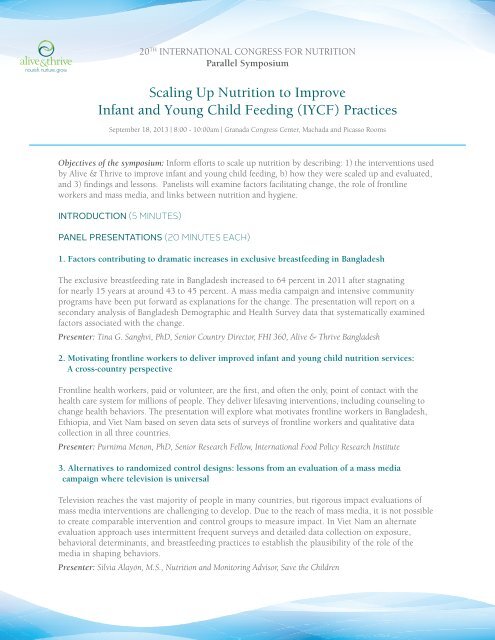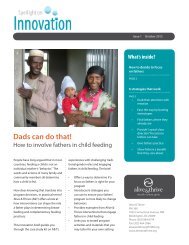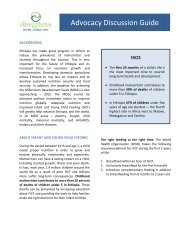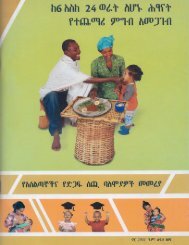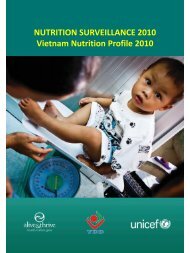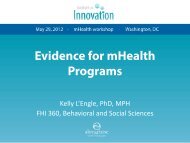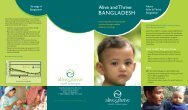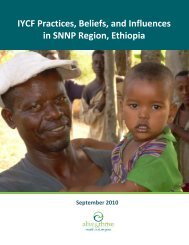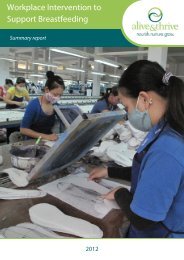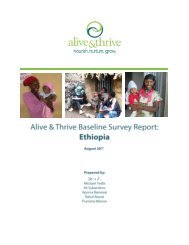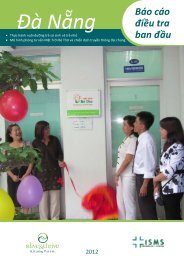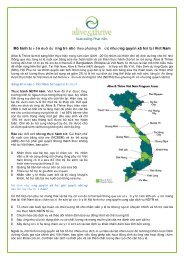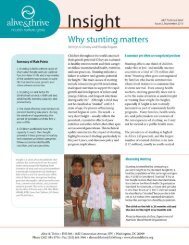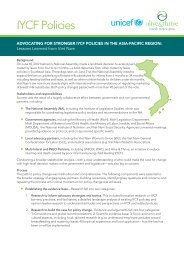Agenda - Alive & Thrive
Agenda - Alive & Thrive
Agenda - Alive & Thrive
Create successful ePaper yourself
Turn your PDF publications into a flip-book with our unique Google optimized e-Paper software.
20 TH INTERNATIONAL CONGRESS FOR NUTRITIONParallel SymposiumScaling Up Nutrition to ImproveInfant and Young Child Feeding (IYCF) PracticesSeptember 18, 2013 | 8:00 - 10:00am | Granada Congress Center, Machada and Picasso RoomsObjectives of the symposium: Inform efforts to scale up nutrition by describing: 1) the interventions usedby <strong>Alive</strong> & <strong>Thrive</strong> to improve infant and young child feeding, b) how they were scaled up and evaluated,and 3) findings and lessons. Panelists will examine factors facilitating change, the role of frontlineworkers and mass media, and links between nutrition and hygiene.Introduction (5 minutes)Panel Presentations (20 minutes each)1. Factors contributing to dramatic increases in exclusive breastfeeding in BangladeshThe exclusive breastfeeding rate in Bangladesh increased to 64 percent in 2011 after stagnatingfor nearly 15 years at around 43 to 45 percent. A mass media campaign and intensive communityprograms have been put forward as explanations for the change. The presentation will report on asecondary analysis of Bangladesh Demographic and Health Survey data that systematically examinedfactors associated with the change.Presenter: Tina G. Sanghvi, PhD, Senior Country Director, FHI 360, <strong>Alive</strong> & <strong>Thrive</strong> Bangladesh2. Motivating frontline workers to deliver improved infant and young child nutrition services:A cross-country perspectiveFrontline health workers, paid or volunteer, are the first, and often the only, point of contact with thehealth care system for millions of people. They deliver lifesaving interventions, including counseling tochange health behaviors. The presentation will explore what motivates frontline workers in Bangladesh,Ethiopia, and Viet Nam based on seven data sets of surveys of frontline workers and qualitative datacollection in all three countries.Presenter: Purnima Menon, PhD, Senior Research Fellow, International Food Policy Research Institute3. Alternatives to randomized control designs: lessons from an evaluation of a mass mediacampaign where television is universalTelevision reaches the vast majority of people in many countries, but rigorous impact evaluations ofmass media interventions are challenging to develop. Due to the reach of mass media, it is not possibleto create comparable intervention and control groups to measure impact. In Viet Nam an alternateevaluation approach uses intermittent frequent surveys and detailed data collection on exposure,behavioral determinants, and breastfeeding practices to establish the plausibility of the role of themedia in shaping behaviors.Presenter: Silvia Alayón, M.S., Nutrition and Monitoring Advisor, Save the Children
4. Evidence linking handwashing to improved child feeding outcomesFindings from formative research on perceptions, practices, barriers, and motivators to improved feedingand handwashing practices are presented along with the results of a trial of an integrated handwashingand complementary feeding intervention. These findings informed a national communication campaign.Presenter: Leanne Unicomb, PhD, Coordinator, Water Sanitation and Hygiene Research Group, InternationalCentre for Diarrhoeal Disease Research, BangladeshQuestions and Answers (30 minutes)Wrap up (5 minutes)Chair, Ellen Piwoz, ScD, Senior Program Officer, Family Health Strategic Alliances,Bill & Melinda Gates Foundation


